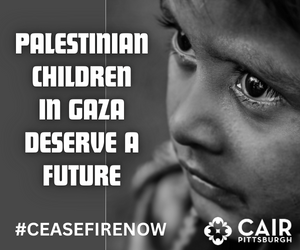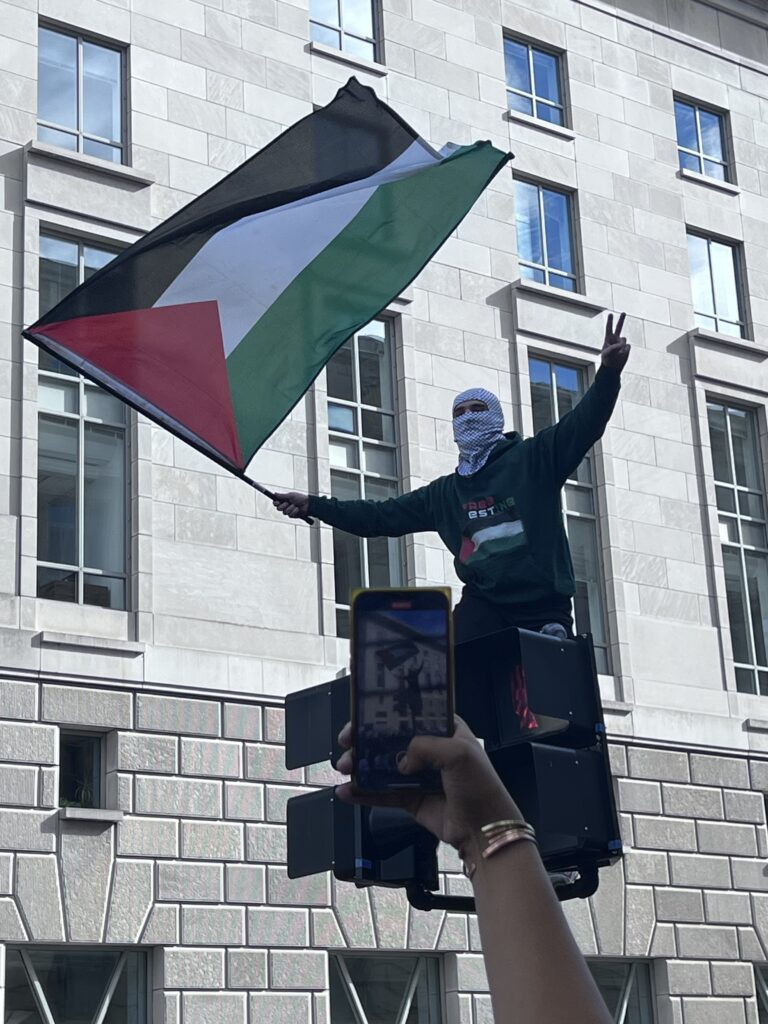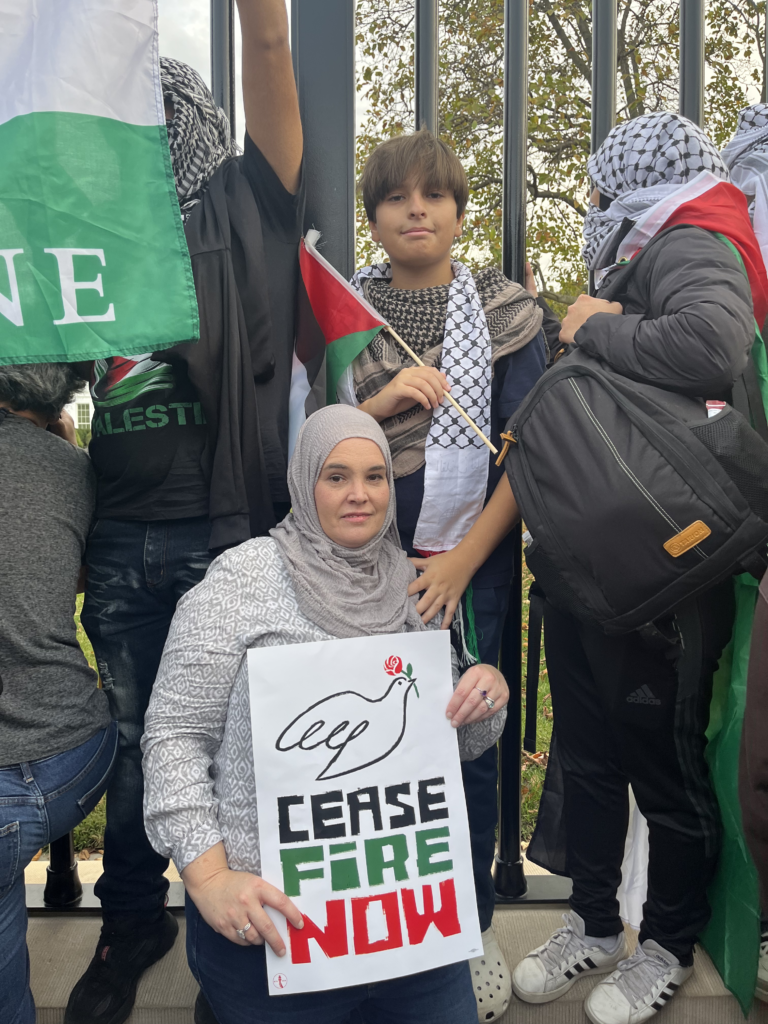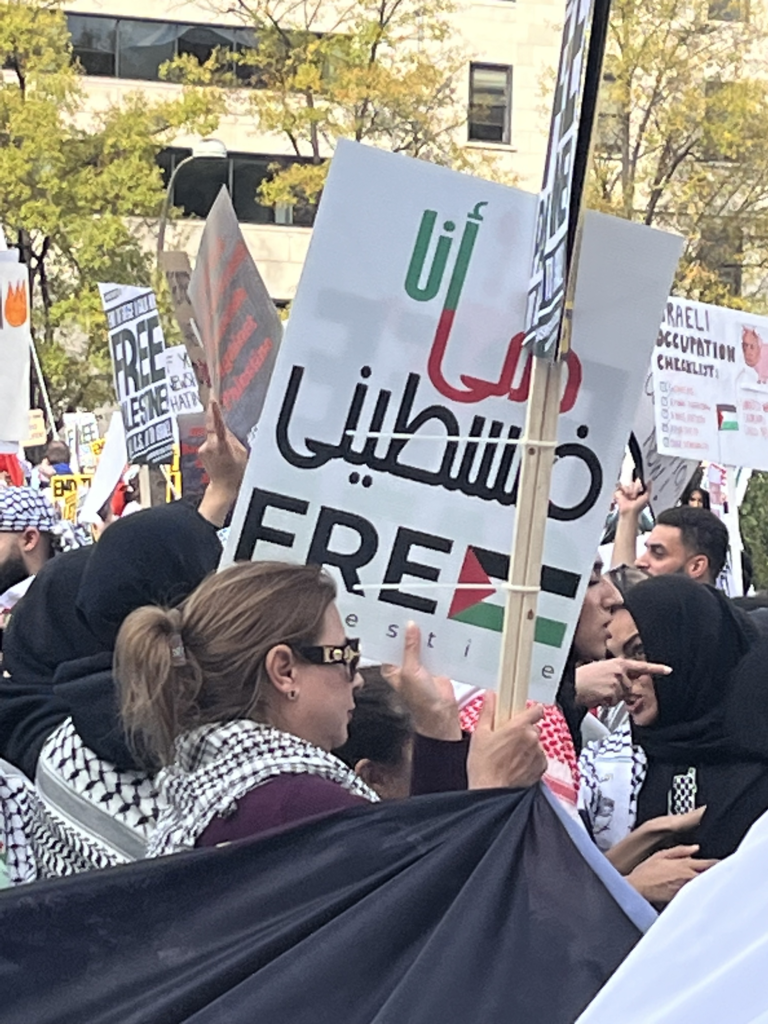PALESTINE RESOURCE GUIDE
The CAIR-Pittsburgh staff and board express their heartfelt condolences and mourn with the families who have lost loved ones in the Israeli assault on Gaza. As many of you are aware, Israel has blocked entry points, cut power, water, and gas, caused communication barriers, and is bombing residential apartments to target civilians intentionally.
Many of us have friends and family members in Gaza and are being personally impacted by this horrific situation. We, along with you, are in pain.
Below is a list of resources you can use to take action, support those affected, and protect yourself as you make these efforts.
CAIR Pittsburgh continues to work tirelessly to address the outrageous double standards and narrative bias propagated by politicians, pro-apartheid hate groups, and major news outlets. Your support will help us in our efforts to counter the false narrative on Palestine and educate the public about the region.
AFFIRM YOUR:
- Unequivocal support for Palestine, for the people of Palestine, and their right to a free, unoccupied homeland. Express deep solidarity and condolences to the Palestinians in Gaza and the remaining occupied territories.
- Belief that every human life has intrinsic value, regardless of nationality, ethnicity, or religious beliefs and that you:
- Oppose the ongoing bombing and killing of civilians in Palestine.
- Oppose the killing of civilians in Israel.
- Unequivocally condemn the targeting of civilians as a war crime.
- Extend your condolences to the families of those impacted by the violence, including Jewish, Palestinian, and Muslim Americans.
- Belief that if the international community offers the Palestinian people a true path to freedom, justice, and a dignified life, then peace and stability can inevitably follow.
CONDEMN:
- One-sided, biased statements from schools, universities, organizations, elected officials, and media outlets and emphasize that every innocent life is sacred, valuable, and should be protected; every life, not just Israeli lives.
- Blatant disregard from elected officials regarding the Palestinian people’s suffering in Gaza at the hands of Israel. Call on them to meet with Palestinian human rights advocates to gain a deeper and more balanced perspective on the decades-long struggle the Palestinian people have endured.
- Islamophobic statements conflating violence in the region with Muslims and Islam.
URGE CONGRESS TO:
- Acknowledge the loss of lives and recognize the humanity on both sides, including Israelis and Palestinians.
- Express support for an immediate ceasefire.
- Demand that the United States reasserts its leadership role as a negotiator in pursuit of a lasting peace. This entails addressing the root causes of violence, terminating Israel’s occupation of Palestinian territories, and ending the Israeli government’s apartheid policies.
- Reiterate our belief that if the international community offers the Palestinian people a true path to freedom, justice, and a dignified life, then peace, and stability can inevitably follow.
ASK SCHOOLS, COMMUNITY COLLEGES, AND UNIVERSITIES TO:
- Adopt a balanced view that ensures a welcoming and safe environment for students of all backgrounds.
- Issue a statement affirming the pain and suffering of the Palestinians—especially the more than two million Palestinians in occupied Gaza, half of whom are children—and who have been called “human animals” by Israeli Defense Minister Yoav Gallant.
SUPPORTING FACTS:
- Israel’s illegal occupation of Palestine began in 1948, when what is known as the Nakba or the “catastrophe” occurred, resulting in 750,000 Palestinians being displaced.
- Over the past 75 years, the Palestinian people have experienced immense suffering, displacement, and a 15-year-long inhumane siege and blockade in Gaza, which has been described as the world’s “largest open-air prison” by human rights organizations. The blockade, which has been ruthlessly imposed by Israel by land, sea, and air has effectively deprived Palestinian residents of freedom of movement and crippled Gaza’s economy. It has severely restricted access to basic human needs, like food, clean water, electricity, and medicine. Israel’s war crimes against Palestinians of all faiths have been well documented by Human Rights Watch, Amnesty International, B’Tselem, and others who have unequivocally declared Israel an apartheid state.
- Israeli leaders and advocates acknowledge Israel’s occupation is like South African apartheid. The former head of Mossad (Tamir Pardo) said recently: “There is an apartheid state here…In a territory where two people are judged under two legal systems, that is an apartheid state.” The world rallied around Black South Africans, acknowledging their right to freedom. The Palestinians should be afforded the same right.
- Gaza, which human rights organizations have described as “the largest open-air prison” due to an ongoing 15-year-long inhumane siege and blockade, is home to two million Palestinians, most of whom are refugees from villages and towns occupied by Israel. The United Nations has called Israel’s aggressions in Gaza and the Occupied West Bank “illegal under international law” and a “substantial obstacle to peace.”
- Palestinians have endured decades of dehumanization and annexation and continue to be persecuted under the apartheid system of the Israeli occupation. The immediate uproar when Israel faces an attack is in stark contrast to the shameful silence in the face of Israel’s brutality toward the Palestinian people for over 75 years. Palestinians are no different than any other people—they want to live free and with dignity on their own land.
- The killing of children has been justified across the West, including by the United States, which has funded the illegal occupation for decades and recently gave Israel the green light for a major military operation in Gaza. Israel’s campaign on Gaza has leveled entire neighborhoods, killing over 1,400 people, more than 60% of them women and children, according to the Gaza Health Ministry.
- Hamas is a byproduct of the occupation; the group formed in 1987—almost 40 years after the dispossession of Palestinians began in 1948.
- The death toll of the conflict in Palestine-Israel is disproportionately borne by the Palestinians. Between 2008 and 2021, at least 5,739 Palestinians and 251 Israelis were killed. According to the UN, the conflict has taken the lives of 23 Palestinians for each Israeli. Over the same time period, at least 121,438 Palestinians and 5,682 Israelis were injured. It is essential to keep in mind that the Palestinian people have endured decades of dispossession, dehumanization, and annexation under the illegal Israeli occupation and apartheid system.
- The only way to permanently stop these cycles of violence is to end the Israeli government’s illegal occupation of Palestine, which kills hundreds of Palestinian civilians every year and subjects millions more men, women and children to systemic, racist oppression, and also takes the lives of Israeli civilians.
- Every life is valuable: Israeli, Palestinian, or any other; however, this compassion and attention is only given to Israelis and not the Palestinians.
You have likely heard the saying that “bad news travels fast.” But fake news travels even faster—and faster yet when events are moving at lightning speed.
Already we have seen disturbing claims regarding atrocities committed by Hamas that have been unsubstantiated or later retracted. Nevertheless, those claims have taken on a life of their own and have been widely disseminated by numerous news and media outlets, including by President Biden. Although Biden’s office has corrected at least one false claim, the effects are long-lasting and have resounding consequences on our understanding of the unfolding conflict.
To that end, we at CAIR Pittsburgh have compiled a list of media outlets and human rights organizations that we trust:
- Al Jazeera
- IMEU: Institute for Middle East Understanding
- B’Tselem
- Human Rights Watch
- Amnesty International
- Middle East Eye
- Radio stations: WESA 90.5 – Pittsburgh’s NPR News
Additionally, be aware that “deepfakes,” which are AI-generated images or videos of fake events, have already flooded the internet, especially social media. Verifying information and relying on trusted news sources makes it all the more important.
The Council on American-Islamic Relations (CAIR) is urgently calling on all Americans who value peace and justice for all people to reach out to their members of Congress and request the following actions in response to the ongoing violence in Israel and Palestine:
- In the U.S. House of Representatives: Co-sponsoring and supporting the Ceasefire Now Resolution, championed by Representatives Cori Bush, Rashida Tlaib, André Carson, Summer Lee, and Delia C. Ramirez.
- In the U.S. Senate: Support the introduction of a Senate companion to the Ceasefire Now Resolution.
- Acknowledge the loss of lives and recognize the humanity on both sides, including Israelis and Palestinians.
- Demand that the United States reassert its leadership role as a negotiator in pursuit of a lasting peace. This includes addressing the root causes of violence and ending Israel’s occupation of Palestinian territories and its apartheid policies.
ACT NOW
In the wake of Israel’s recent assault on Gaza, many schools, universities, employers, and elected officials have released one-sided statements of support for Israel. These statements fail to acknowledge the dispossession of the Palestinian people under the illegal Israeli occupation and apartheid system or their humanity as they are bombarded and killed by Israeli forces.
We know that these blatantly biased statements can be extremely upsetting and damaging to the Muslim and Palestinian communities, so we created downloadable templates you can fill out and send to your school, university, employer, and elected officials. Download the templates below:
FOR STUDENTS AND PARENTS
- Higher Education Letter to Schools Regarding Palestine
- Parent/Guardian Letter to Schools (K-12) Regarding Palestine
FOR EMPLOYEES
FOR THE CIVICALLY ENGAGED
*These templates constitute suggested material to empower you to advocate on behalf of yourself and/or your child. Please note that they do not constitute legal advice. Please use your personal judgment to adapt the content to your particular case. If you need more direct assistance, please contact us at 412-606-3601
Hostilities in Gaza and Israel have created appalling human suffering, physical destruction and collective trauma across Israel and the Occupied Palestinian Territory. The international community has a responsibility to use all its influence to prevent further escalation and end this crisis.
UN Secretary-General António Guterres
Protesting is an important way to exercise your right to free speech and to make your voice heard on issues of importance to you. However, it can also be intimidating, and so we encourage you to familiarize yourself with your rights before you and your loved ones go out to protest with community members.
SAFETY AT PROTESTS
What to Wear:
- Personal Protective Equipment (PPE): be sure to wear adequate masks to protect from COVID-19;
- Comfortable clothes and shoes that can protect from pepper spray or tear gas;
- Shatter-resistant eye protection (i.e. goggles, sunglasses, gas mask).
What to Bring:
- Extra clothes and PPE in case you get contaminated with pepper spray/tear gas.
- Water and snacks.
- I.D. and emergency contact information.
- Prescription medication.
- Basic first aid.
- Wet wipes and tissues.
- Enough money for a payphone, food, and transportation.
Do Not:
- Wear contacts. This may cause damage if you get attacked with tear gas.
- Put Vaseline, mineral oil, oil-based sunscreen or moisturizers on skin as they can trap chemicals.
- Go alone. Go with people you know well and trust.
- Wear things that can be grabbed (i.e. jewelry, hair ties, loose hair).
RIGHTS WHILE ATTENDING A PROTEST
- Your rights are strongest on the streets, sidewalks, and parks. You also likely have the right to speak out on other public property, like plazas in front of government buildings, so long as you are not blocking access to the building or interfering with other purposes. Freedom of speech protects the content of your speech, no matter how unpopular.
- Freedom of speech does not protect slander, libel, obscenity, “true threats”, or speech that incites imminent violence or breaking the law.
- Megaphones and bullhorns may be used. Permits may be required for music, drums, and loudspeakers. As always, check local ordinances for permit information.
- Counter-protesters also have free speech rights. They cannot physically disrupt the protest they are against. Police must treat both groups equally. Police are permitted to keep antagonistic groups separated but should allow them to be within sight and sound of one another.
- When you are lawfully present in any public space, you have the right to photograph or video anything in plain view, including federal buildings and the police. Owners of private property may set rules related to photography or video.
- Police officers may not confiscate or demand to view your photographs or video without a warrant. They also cannot delete data under any circumstances. However, they may order you to cease activities that they determine are interfering with law enforcement operations.
WHAT HAPPENS IF THE POLICE STOP ME?
- Stay calm. Make sure to keep your hands visible. Do not argue, resist, or obstruct the police, even if you believe they are violating your rights. Point out that you are not disrupting anyone else’s activity and that the First Amendment protects your actions.
- If you are stopped, ask the officer if you are free to leave. If the answer is yes, calmly walk away.
- If you are detained, ask the officer what crime you are suspected of committing, and remind the officer that taking photographs is your right under the First Amendment and does not constitute reasonable suspicion of criminal activity.
- If you are under arrest, you have a right to ask why. Otherwise, say you wish to remain silent and ask for a lawyer immediately. Do not say anything or sign anything without a lawyer. Refer to our list of resources below for legal assistance when arrested.
- You should never consent to a search of yourself or your belongings. If you do explicitly consent, it can affect you later in court.
- Police may “pat down” your clothing if they suspect you have a weapon and may search you after an arrest.
- Keep phone numbers on your person (i.e. write them on your arm) in case you are detained and arrested. You are allowed to make up to three local phone calls if you are arrested. A parent with custody of minor children can make two additional calls to arrange childcare.
- If you are arrested for an infraction and you have a valid I.D. on you, the police must give you a ticket and release you on the spot unless you refuse to sign the ticket.
WHAT TO DO IF YOU BELIEVE YOUR RIGHTS HAVE BEEN VIOLATED
- When you can, write down everything you remember, including the law enforcement officers’ badge and patrol car numbers and the agency they work for.
- Get contact information for witnesses.
- Take photographs of any injuries.
- Once you have all of this information, you can file a written complaint with the agency’s internal affairs division or civilian complaint board.
- CONTACT CAIR PITTSBURGH



